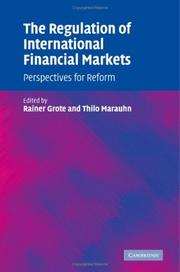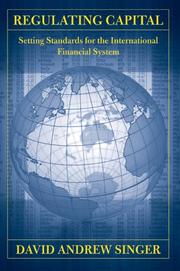| Listing 1 - 7 of 7 |
Sort by
|
Book
ISBN: 2804412466 9782804412463 Year: 2003 Volume: 1 Publisher: Gent Larcier
Abstract | Keywords | Export | Availability | Bookmark
 Loading...
Loading...Choose an application
- Reference Manager
- EndNote
- RefWorks (Direct export to RefWorks)
geldhandel --- Financial law --- beleggen --- effectenhandel --- Belgium --- 347.73 <493> --- banken --- beurs --- effecten --- belgie --- europa --- EEU / Central & Eastern Europe --- BE / Belgium - België - Belgique --- US / United States of America - USA - Verenigde Staten - Etats Unis --- 333.745 --- 333.605 --- 333.604 --- U50 - Effets de commerce et instruments de paiement - Handelseffecten en betaalinstrumenten --- 336.76 --- Financiële markten --- Financieel recht. Commerciele organisatie. Handelsinstellingen--België --- banques --- bourse --- titres --- belgique --- europe --- effectisering. Titrisatie. --- Nieuwe financiële instrumenten. --- Reglementering van de financiële markten. Controle op de uitgifte van effecten. --- 347.73 <493> Financieel recht. Commerciele organisatie. Handelsinstellingen--België --- effectisering. Titrisatie --- Nieuwe financiële instrumenten --- Reglementering van de financiële markten. Controle op de uitgifte van effecten

ISBN: 0415208432 0415208424 0203254473 1280334045 0203013921 1134619332 9781134619337 9780203254479 9786610334049 6610334048 9780203013922 9780415208420 9780415208437 9781134619283 1134619286 9781134619320 1134619324 9781280334047 Year: 1999 Publisher: London ; New York : Routledge,
Abstract | Keywords | Export | Availability | Bookmark
 Loading...
Loading...Choose an application
- Reference Manager
- EndNote
- RefWorks (Direct export to RefWorks)
Recent events in East Asia have highlighted the risks of volatility and contagion in a financially integrated world. Countries in the region had been at the forefront of the movement towards increased integration but the crisis that struck Thailand in July 1997, and the rapidity with which it spread to other East Asian nations, suggested that all was not well. Weaknesses in domestic financial intermediation, poor corporate governance and deficient government responses to large capital inflows all played a role in the build-up of vulnerability. Asia-Pacific Financial Deregulation
ASI / Asia - Azië - Asie --- PAC / Pacific Ocean Countries --- 333.139.2 --- 321.2 --- 382.240 --- 333.600 --- 333.604 --- NBB congres --- Bankcontrole en -reglementering. Reglementering van het bankberoep. --- Economisch beleid van de overheid. --- Evolutie van de betalingsbalans: algemeenheden. --- Financiële markten. Kapitaalmarkten (algemeenheden). --- Reglementering van de financiële markten. Controle op de uitgifte van effecten. --- Conferences - Meetings --- Financial services industry --- Government policy --- Services, Financial --- Service industries --- Economisch beleid van de overheid --- Bankcontrole en -reglementering. Reglementering van het bankberoep --- Financiële markten. Kapitaalmarkten (algemeenheden) --- Reglementering van de financiële markten. Controle op de uitgifte van effecten --- Evolutie van de betalingsbalans: algemeenheden
Book
ISBN: 9056296639 9786613050502 9048513987 1283050501 9789048513987 9789056296636 Year: 2011 Publisher: Amsterdam : Vossiuspers UvA,
Abstract | Keywords | Export | Availability | Bookmark
 Loading...
Loading...Choose an application
- Reference Manager
- EndNote
- RefWorks (Direct export to RefWorks)
In zijn inaugurele rede tot hoogleraar Competition Economics and Regulation, vestigt Maarten Pieter Schinkel de aandacht op hoe de markttoezichthouders kunnen verworden tot een pion in het spel tussen de machtige bedrijven. Aan de hand van voorbeelden uit de speltheorie, kunstmatige intelligentie, Pac-Man en het forensisch bewijs verkregen door middel van undercover surveillance, stelt Schinkel dat het weldegelijk mogelijk is een onafhankelijk markttoezicht te ontwikkelen. In zijn rede stelt hij dat de markttoezichthouders een sterke mate van bevoegdheden moeten hebben om creatief om te kunnen
Electronic payment, Games. --- Games. --- Online games. --- Game theory. --- Games, Theory of --- Theory of games --- Mathematical models --- Mathematics --- Stock exchanges --- Game theory --- E-books --- Bulls and bears --- Commercial corners --- Corners, Commercial --- Equity markets --- Exchanges, Securities --- Exchanges, Stock --- Securities exchanges --- Stock-exchange --- Stock markets --- Capital market --- Efficient market theory --- Speculation --- Stock exchanges. --- AA / International- internationaal --- 333.604 --- 333.139.2 --- Reglementering van de financiële markten. Controle op de uitgifte van effecten --- Bankcontrole en -reglementering. Reglementering van het bankberoep

ISBN: 052183144X 9780521831444 9780511494505 9780521103794 0521103797 1107148480 0511183976 0511146760 0511312393 0511494505 1280421789 0511145748 0511146183 9780511146763 9780511146183 9780511145742 9781280421785 9786610421787 6610421781 Year: 2006 Publisher: Cambridge : Cambridge University Press,
Abstract | Keywords | Export | Availability | Bookmark
 Loading...
Loading...Choose an application
- Reference Manager
- EndNote
- RefWorks (Direct export to RefWorks)
International financial relations have become increasingly important for the development of global and national economies. At present these relations are primarily governed by market forces, with little regulatory interference at the international level. In the light of numerous financial crises, this abstinence must be seriously questioned. Starting with an analysis of the regulatory problems at the international level, with only minimal powers entrusted to international organisations, this book develops various possibilities for reform. On the basis of an historical analysis, the book first adopts a comparative approach to national attempts to regulate international financial markets, then outlines the potential of relevant institutions and finally develops a policy perspective. It seeks to provide a framework for analysing options for the regulation of international financial markets from a public international law and comparative law perspective.
346.08 --- banken, centraal --- International economic relations --- International finance --- 333.604 --- AA / International- internationaal --- Economic policy, Foreign --- Economic relations, Foreign --- Economics, International --- Foreign economic policy --- Foreign economic relations --- Interdependence of nations --- International economic policy --- International economics --- New international economic order --- Economic policy --- International relations --- Economic sanctions --- Law and legislation --- Reglementering van de financiële markten. Controle op de uitgifte van effecten --- globalisering --- recht, internationaal --- -International economic relations --- International monetary system --- International money --- Finance --- Financial law --- International economic relations. --- Law and legislation. --- Law --- General and Others --- MARCHES FINANCIERS --- LIBERALISATION --- REGULATION
Book
ISBN: 9780521762663 0521762669 9781139019446 1139365509 1107224713 1139378023 9786613719225 1139375164 1139371177 1139376594 1139019449 128087791X 1139379453 9781139379458 9781139375160 9781107224711 9781139365505 6613719226 9781139378024 9781139371179 9781139376594 Year: 2012 Publisher: Cambridge : Cambridge University Press,
Abstract | Keywords | Export | Availability | Bookmark
 Loading...
Loading...Choose an application
- Reference Manager
- EndNote
- RefWorks (Direct export to RefWorks)
The recent financial crisis proved that pre-existing arrangements for the governance of global markets were flawed. With reform underway in the USA, the EU and elsewhere, Emilios Avgouleas explores some of the questions associated with building an effective governance system and analyses the evolution of existing structures. By critiquing the soft law structures dominating international financial regulation and examining the roles of financial innovation and the neo-liberal policies in the expansion of global financial markets, he offers a new epistemological reading of the causes of the global financial crisis. Requisite reforms leave serious gaps in cross-border supervision, in the resolution of global financial institutions and in the monitoring of risk originating in the shadow banking sector. To close these gaps and safeguard the stability of the international financial system, an evolutionary governance system is proposed that will also enhance the welfare role of global financial markets.
Financial law --- Financial institutions, International --- International finance --- Financial services industry --- Global Financial Crisis, 2008-2009 --- Law and legislation --- Law and legislation. --- Political aspects. --- Institutions financières internationales --- Finances internationales --- Services financiers --- Crise financière mondiale, 2008-2009 --- Droit --- Aspect politique --- 332.042 --- Ja3 --- 333.139.2 --- 333.604 --- 347.734 --- AA / International- internationaal --- Global Economic Crisis, 2008-2009 --- Subprime Mortgage Crisis, 2008-2009 --- Financial crises --- Political aspects --- Bankcontrole en -reglementering. Reglementering van het bankberoep --- Reglementering van de financiële markten. Controle op de uitgifte van effecten --- Bank- en spaarinstellingen (recht) --- Law --- General and Others
Book
ISBN: 9814360678 981436066X 9789814360678 9789814360661 Year: 2012 Publisher: Singapore : World Scientific Pub. Co.,
Abstract | Keywords | Export | Availability | Bookmark
 Loading...
Loading...Choose an application
- Reference Manager
- EndNote
- RefWorks (Direct export to RefWorks)
This book is a collection of papers presented in the conference held at the Federal Reserve Bank of Chicago in September 2010, that examines the role of macroprudential regulation in the financial industry. Shocked by the experience of the last few years, many argue that the more traditional microprudential regulatory tools are inadequate to create a safe and stable financial system. The microprudential paradigm relies on the presumption that the financial system as a whole can be made safe by ensuring individual financial institutions are made safe. This ignores interconnections and external
Banks and banking --- Banking law --- Law, Banking --- Law and legislation --- Financial institutions --- Macroeconomics --- Economic policy --- State supervision --- E-books --- Economic nationalism --- Economic planning --- National planning --- State planning --- Economics --- Planning --- National security --- Social policy --- Financial intermediaries --- Lending institutions --- Associations, institutions, etc. --- Agricultural banks --- Banking --- Banking industry --- Commercial banks --- Depository institutions --- Finance --- Money --- -Financial institutions --- -Macroeconomics --- -Economic policy --- -AA / International- internationaal --- 333.139.0 --- 334.10 --- 333.604 --- 332.109 --- Hb2 --- -Congresses --- Congresses --- Controle en nationalisatie van de banken: algemeen --- Algemene economie : algemeenheden --- Reglementering van de financiële markten. Controle op de uitgifte van effecten --- -State supervision

ISBN: 0801445256 0801461847 9780801461842 0801476712 9780801476716 9780801445255 9780801476716 Year: 2011 Publisher: Ithaca, NY
Abstract | Keywords | Export | Availability | Bookmark
 Loading...
Loading...Choose an application
- Reference Manager
- EndNote
- RefWorks (Direct export to RefWorks)
Financial instability threatens the global economy. The volatility of capital movements across national borders has led many observers to argue for a reformed "global financial architecture," a body of consistent rules and institutions to prevent financial crises. Yet regulators have a decidedly mixed record in their attempts to create global standards for the financial system. David Andrew Singer seeks to explain the varying pressures on regulatory agencies to negotiate internationally acceptable rules and suggests that the variation is largely traceable to the different domestic political pressures faced by regulators. In Regulating Capital, Singer provides both a theory of the effects of domestic pressures on international regulation and a detailed analysis of regulators' attempts at international rulemaking in banking, securities, and insurance. Singer addresses the complexities of global finance in an accessible style, and he does not turn away from the more dramatic aspects of globalization; he makes clear the international implications of bank failures and stock-market crashes, the rise of derivatives, and the catastrophic financial losses caused by Hurricane Katrina and the events of September 11.
Banking law -- International cooperation. --- Insurance law -- International cooperation. --- International economic integration. --- International finance -- Law and legislation. --- International finance. --- Securities -- International cooperation. --- International finance --- International economic integration --- Banking law --- Securities --- Insurance law --- Finance --- Business & Economics --- International Finance --- Law and legislation --- International cooperation --- Law and legislation. --- International cooperation. --- Insurance --- Law, Insurance --- Blue sky laws --- Capitalization (Finance) --- Investment securities --- Portfolio --- Scrip --- Securities law --- Underwriting --- Banks and banking --- Law, Banking --- Common markets --- Economic integration, International --- Economic union --- Integration, International economic --- Markets, Common --- Union, Economic --- International monetary system --- International money --- Commercial law --- Contracts, Aleatory --- Investments --- Investment banking --- Financial institutions --- International economic relations --- State supervision --- 332.042 --- Fb2 --- 333.139.0 --- 333.604 --- 333.611 --- 368.04 --- AA / International- internationaal --- Controle en nationalisatie van de banken: algemeen --- Reglementering van de financiële markten. Controle op de uitgifte van effecten --- Organisatie, reglement, bewaking --- Controle van de verzekeringen
| Listing 1 - 7 of 7 |
Sort by
|

 Search
Search Feedback
Feedback About
About Help
Help News
News